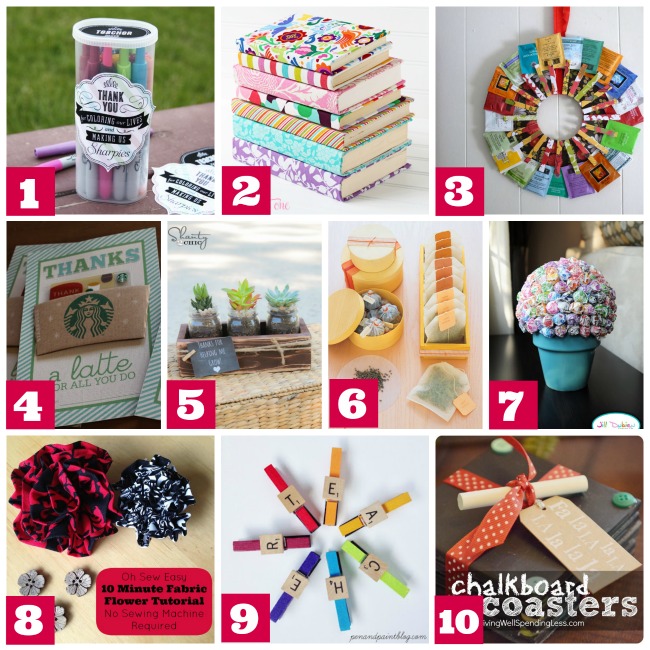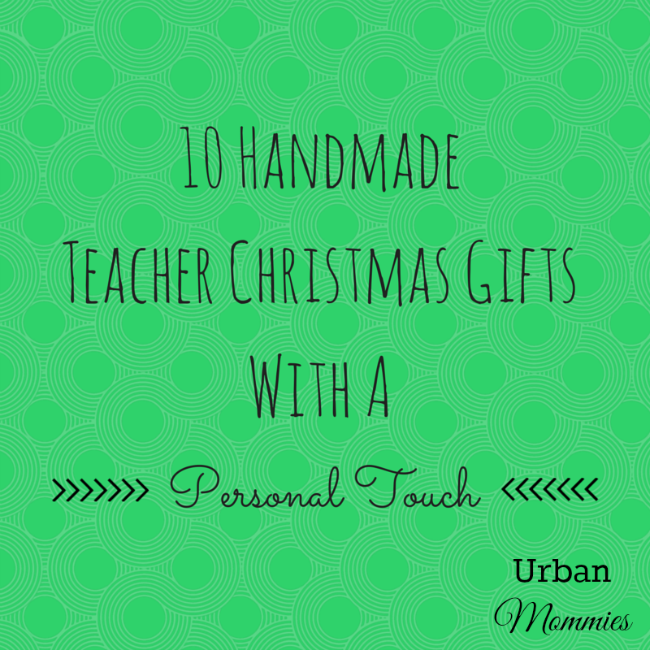We’ve all been there: unloading the backpack at the end of the day and throwing away half-eaten sandwiches and mushy bananas.
Teachers do so much for our kids, each and every day. We spend so much time talking to our kids about how great their teachers are, but when was the last time you told your child’s teacher that you appreciate all that they do for your kiddo?
Here are 10 handmade teacher Christmas gifts that have a personal touch to help you express your appreciation.
1. Thank you for coloring our lives and making us Sharpies teacher gift from Design Wash Rinse Repeat
2. DIY fabric covered book (this would be so cute to do with a journal or notebook) from Two Twenty One
3. Homemade Tea Wreath from Kojo Designs
4. Thanks a Latte for all you do teacher gift from Longing For Home
5. Succulents planter from Shabby 2 Chic
6. DIY Tub Teas from Martha Stewart
7. Dum-Dum lollipop tree from Meet the Dubiens
8. DIY Oh Sew Easy 10 Minute Fabric Flower Brooch from Sew Creative
9. Teacher Scrabble tile coloured clothespins from Pen and Paint
10. DIY Chalkboard Coasters from Living Well Spending Less
“Liar, liar, pants on fire!”
Most parents are completely flabbergasted when their offspring tells a fib, no matter what age they are. However, lying is a part of learning and growing and, as the parent, you need to know how to handle the tale-telling appropriately and effectively. It’s essential to differentiate between the lies that should be ignored and the ones that must be addressed and handle lying in an efficient manner with love and understanding, but also help your child recognize the value of the truth.
Little Ones – Storytelling
Young children who fall in the toddler and preschool age category may tell lies that are simply a representation of their creative imaginations running wild. When this happens, you can address the fact that they are not telling the truth by saying, “Wow! You are very creative!” Or challenge them by asking, “Is that really true?” Give your little one the chance to think about their tall tale, tell you more descriptions, and decipher the truth from the un-truth.
Do not be misled, however…children will learn early, usually beyond the age of 3 or 4, that lying might be the solution to avoiding the consequences of their actions and, ultimately, deceiving someone.
Essentially, your little one will lie to please you or get your attention.
Older Children – Avoiding Consequences
Your older child will lie to achieve a different outcome. When it all boils down, your school aged child and teenager will fib to solve some type of problem.
When you know that your older child has told a fib, let them know that you are aware of the truth and that you would prefer that they tell the truth rather than be deceitful. You could tell them, “I’m sure that you meant to do your homework, but you still have some work left to do. We all make mistakes, but in the future, I would prefer that you practice honesty when I ask you a question.”
Parental Lying – The Messages that We Send
Keep in mind that we all tell “little white lies” sometimes and that we need to set the example, as the parents. If our children witness us lying, they will get mixed signals that tell them that lying is okay sometimes.
Without thinking about it, you might tell your friend that you have an appointment that conflicts with meeting them today or – even worse – you might tell your child to tell the caller on the phone that you are in the shower when you honestly do not want to come to the phone.
Before asking your child to lie for you or lying in front of them, think about the significance of the message that it sends to your offspring and ask yourself if it is worth it to relay that message.
When handling a fibbing child, do not promise him that there will not be any punishment if they tell the truth – and then dole out a punishment once the truth is revealed. It is vital to teach your child that lying is not okay, both by holding discussions with them that help them to recognize truth from un-truths and showing them with our own behavior.
Q – I need help. I’m completely overwhelmed with trying to balance my work with mothering my two boys (ages 2 and 4) and managing the household. I don’t know how to make it all work, and it feels like i’m not doing any of them well. I look at friends and it seems as though they are somehow balancing it all.
Are you ready? Why not skip the tie and cufflinks. Meaningful, special gifts could turn into heirlooms and make him smile for a whole year. We welcome you ideas as well, but for now, here are a few of ours…
1. Find an artist and get a painting or sketch made from his favourite photograph.
 There are times when an artist touches you and you never look at your life in the same way again. This is how I reacted to the line drawings by Lisa Golightly for Kiki & Polly. Check out the new 2009 calendars with art on each page, or for a special present, have a custom portrait done. Above print: Walking the Dog www.kikiandpolly.com
There are times when an artist touches you and you never look at your life in the same way again. This is how I reacted to the line drawings by Lisa Golightly for Kiki & Polly. Check out the new 2009 calendars with art on each page, or for a special present, have a custom portrait done. Above print: Walking the Dog www.kikiandpolly.com
Phthalates are a common industrial chemical used in PVC plastics, solvents, and synthetic fragrances. They’ve been around since the 1930’s, and now they’re pretty ubiquitous; when they tested 289 people in 2000, the CDC found phthalates in all of the subjects’ blood at surprisingly high levels.
On the route to discovering better balance in your life, one of the key indicators of your success will be your ability to become more self-content.
One way to develop a strong sense of self-contentment is to give yourself the gift of self-appreciation. Offer yourself the same respect and kindness you give to others you care deeply for.
One of the key building blocks to a healthy lifestyle is a well-balanced diet. To many, that means cutting out the unhealthy snacks and “eating right” during the main meals. But what does eating right mean? While it means different things to different people, most will agree on the following three components:
Babies and Toddlers – Good food – The Australian Women’s Weekly Cookbooks
Good for 9 months and up


